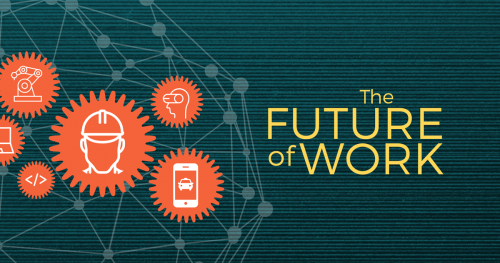The future of work
As the world is changing and driven by technology, every country, every business must change as well. For the past fifty years, technology had driven many changes all over the world, but with the acceleration of technological innovation, today’s changes are happening much faster and more companies and countries are being impacted. A Wall Street analyst advocates the new rule for all businesses: “Today, every company, every business has to transform itself into a technology company, that means everything, every process, must apply technology, to maximize efficiency and competitiveness. To do that, every company needs to have a strong technically skilled workforce. Either they retrain their current workers on using technology or HIRING new college graduates with technical skills and FIRING workers whose skills are obsolete. Without a highly-skilled workforce, no company can survive in this globally competitive environment.”
For many years, companies across all industries in the U.S. and Western Europe have adopted technology to grow fast and expand to other markets where “slow-to-change” local companies are being eliminated. For example, when Amazon expanded their online business to several countries, thousands of large and small physical stores shut down or filed for bankruptcy. A Chinese economist wrote: “The first wave of business expanding was the fast-food market, when McDonald, KFC, PizzaHut, and Starbuck, etc. moved here, hundred thousands of restaurants had to close. We learned from that and prepare for the next wave. When Google, Facebook, and Amazon are planning to move here, we already established Baidu, Alibaba, Tencent etc. so we are readied to compete.” As competition “heat up” in every market all over the world, many company leaders begin to realize the fact that without a technical skilled workforce, they cannot compete so they begin to adopt technology to transform their business into a technology-focus company.
As students, and knowing this fact, what should you do? The obvious answer is you need to develop skills that your job market needs. You need to read more and learn more to expand your knowledge beyond what you see in your local area to understand the global trends. You need to know all the high-demand skills that you can learn so by graduation, you can tell the company: “I have the skills that you need and I am readied to work .”
The important thing for you to do NOW is to be prepared for the opportunity. That means you have to focus on developing the high-demand skills. But even having a good job, you will need to continue to learn more because everything you learn today has an “expiration date.” As technology continues to accelerate, many things will change and impact your job. If you want to keep your job, you need to stay up-to-date. As automation and robots are being widely used, they will take over most labor works, as artificial intelligence is being applied, it will change the nature of office works so most future jobs will require specific skills and you need to continue to learn in order to maintain your position in this technology-driven world.
The problem is the attitude of a majority of workers. Once they get a job, they stop learning. Many are busy with trivial matters and do not pay attention to what happens outside of their working environment. Many do not have a good reading habit so they do not follow what is happening and which technology is becoming obsolete. On the company side, many businesses owners and managers are feeling the competition from all over the world. Their local company is no longer secured as the market has changed and global companies are moving in and compete with them. They need to implement the latest technology such as Artificial Intelligence and Machine Learning to increase efficiency and productivity, but they do not know how so they have to depend on their technical workers to achieve their goals. If their technical workers do not have the needed skills, they will have to find these talents from somewhere else. This is an opportunity for lifelong learners and if they have the skills, they are valuable. When the company is desperately looking for people with these skills, they can negotiate a better salary or high-compensation.
Some workers told me that when new technology is needed, they can still learn about it. What they do not understand is when a company have to hire new workers with the skills that they need, they often get rid of workers with obsoleted skills first, to make room for new workers. If you wait until then, it is too late. The issue is NOT about learning something when you need but to prepare and learn new things BEFORE they are needed. That is why, all workers need to continually learn new skills because your company needs you to be up-to-date, and you also need to keep your skills up-to-date.
If you are someone who graduates and already has a job, you need to continue to read more and keep an open mind to all the changes that are happening around you. Do not waste time on trivial things but continue to learn new things and be a lifelong learner, that is the ONLY way to ensure that you will have a good career that lasts a lifetime in this fourth industrial revolution era.
Sources
- Blogs of Prof. John Vu, Carnegie Mellon University
